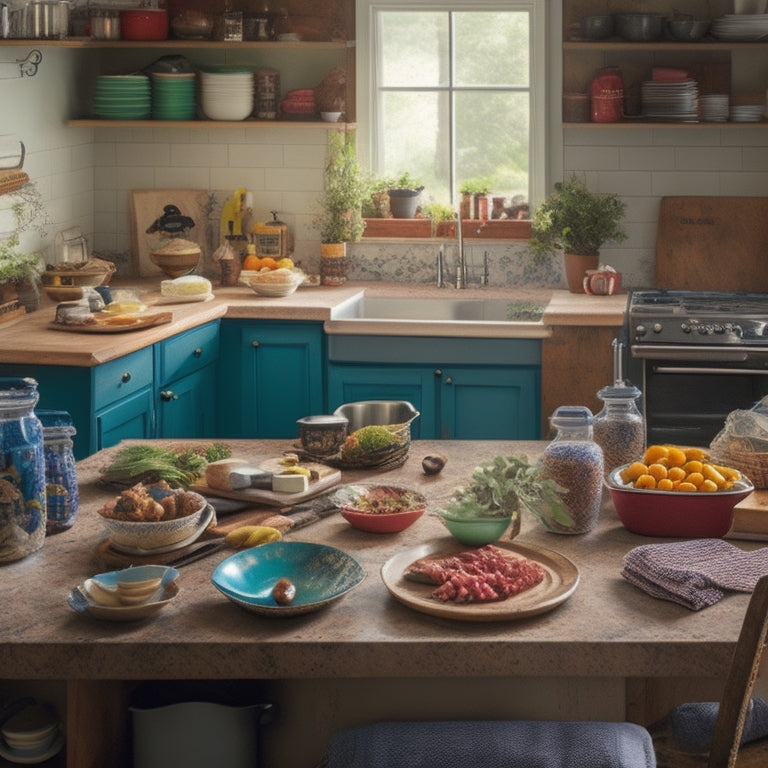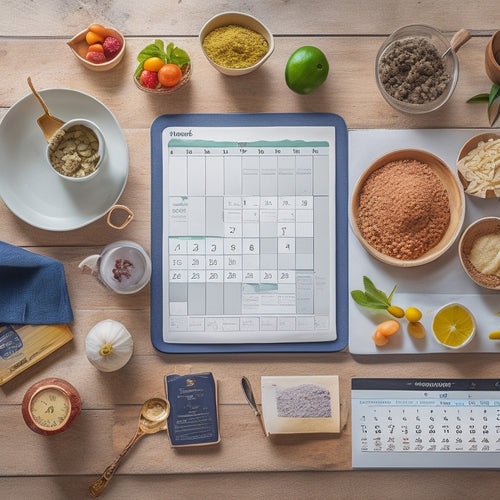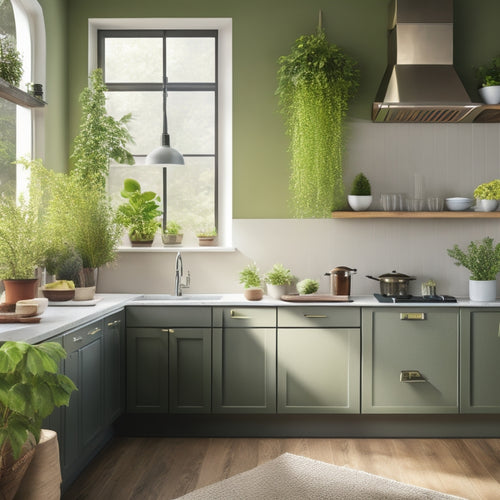
Why Cluttered Kitchens Hold You Back: Ebook Bundle
Share
You're living with a constant sense of anxiety and overwhelm every time you step into your kitchen because of the clutter that's been holding you back in ways you never realized. Cluttered kitchens increase stress levels, strain relationships, and waste your time searching for misplaced items. They also compromise food safety, hinder meal planning, and even lead to unintended nutrient deficiencies. Additionally, cluttered kitchens can mirror financial stress, leading to anxiety and poor financial decisions. By understanding the impact of clutter on your kitchen, you'll begin to uncover the hidden benefits of a clutter-free space that awaits you, just beyond the chaos.
Key Takeaways
• Cluttered kitchens increase stress levels, trigger anxiety, and lead to feelings of helplessness and frustration, impacting mental well-being.
• A clutter-free kitchen fosters harmony and cooperation, while a cluttered space strains social dynamics, leading to resentment and irritability.
• Cluttered kitchens waste time, decrease productivity, and increase stress levels due to misplaced items, ineffective meal planning, and prolonged cooking times.
• Cluttered kitchens harbor hidden dangers like pest infestations, electrical cord hazards, and tripping risks, compromising health and safety.
• Cluttered kitchens contribute to financial stress, wasted money, and poor financial decisions, whereas a clutter-free kitchen facilitates clearer budgeting and financial freedom.
Clutter's Impact on Mental Health
Living in a cluttered kitchen can lead to increased stress levels, as the visual overload of scattered items and dirty dishes can trigger feelings of anxiety and overwhelm. You might find yourself constantly on edge, never feeling fully relaxed or at peace in your own home. This is because clutter can be a significant anxiety trigger, making it difficult for you to focus and think clearly.
When you're surrounded by mess, your mind can feel cluttered too, leading to feelings of helplessness and frustration. To break free from this cycle, incorporate mindfulness practices into your daily routine. Take a few minutes each day to tidy up, putting away dishes and wiping down countertops. As you work, focus on your breath and the sensations in your body.
Notice how your anxiety levels decrease as the clutter disappears. By creating a sense of order and calm in your kitchen, you can create a more peaceful state of mind. Remember, every small step towards a clutter-free kitchen is a step towards better mental health.
Kitchen Chaos Affects Relationships
As you work towards a clutter-free kitchen, you'll likely notice a ripple effect on your relationships, with a more organized space fostering a sense of harmony and cooperation among household members. A cluttered kitchen can lead to social dynamics that are strained and tense, making it challenging to navigate mealtimes and daily routines.
Family tensions can arise from the frustration and stress that comes with living in a disorganized environment. When everyone has their own space and can easily find what they need, conflicts are less likely to occur. On the other hand, a cluttered kitchen can lead to feelings of resentment and irritability, making it difficult to maintain healthy relationships.
Time Wasted on Disorganization
You're likely unaware of the significant amount of time you're wasting on a daily basis due to your cluttered kitchen, from searching for misplaced utensils to redoing meals because of expired ingredients. The truth is, a cluttered kitchen can lead to lost hours, which add up quickly.
Think about it: every minute you spend searching for a specific spice or utensil is a minute taken away from more important tasks or relaxation time.
In the daily rush to get meals prepared, it's easy to overlook the time spent on disorganization. However, this wasted time can have a significant impact on your overall productivity and stress levels.
By not having a system in place for organizing your kitchen, you're basically stealing time from yourself and your loved ones.
Imagine having an extra hour each day to focus on what matters most – whether that's spending quality time with family, pursuing a hobby, or simply enjoying a quiet cup of coffee.
Clutter's Effect on Meal Preparation
Every day, cluttered kitchens force you to spend at least 15-20 extra minutes preparing meals, which can add up to a whopping 100-140 minutes per week. This wasted time can lead to frustration, stress, and a lack of motivation to cook healthy meals. Additionally, cluttered kitchens can compromise food safety by increasing the risk of cross-contamination and spoilage.
| Cluttered Kitchen Consequences | Impact on Meal Preparation |
|---|---|
| Difficulty finding ingredients | Slows down recipe execution, leading to meal delays |
| Limited counter space | Forces you to prepare meals in batches, increasing cooking time |
| Disorganized recipe storage | Stifles recipe creativity, making it hard to find inspiration |
Cluttered kitchens not only waste your time but also stifle your creativity in the kitchen. With a clutter-free kitchen, you'll have more time to experiment with new recipes and ingredients, leading to healthier and more enjoyable meals. By decluttering your kitchen, you'll be able to cook with confidence, ensuring food safety and sparking your recipe creativity.
Hidden Dangers of Cluttered Kitchens
Cluttered kitchens harbor hidden dangers that can put your health and safety at risk, from pest infestations to electrical hazards. You might think that a little clutter is harmless, but it can lead to serious consequences.
For instance, food debris and crumbs can attract pests like cockroaches, rodents, and ants, which can spread diseases and trigger allergies. Moreover, cluttered countertops and floors can conceal electrical cords, increasing the risk of fire hazards. A single spark can ignite a blaze, putting you and your loved ones in harm's way.
Additionally, a cluttered kitchen can also lead to tripping hazards, sharp object injuries, and even explosions from faulty appliances or gas leaks. It's essential to take control of your kitchen's clutter to avoid these risks.
Stagnant Productivity in the Kitchen
A staggering 75% of home cooks admit to feeling frustrated and stuck in their kitchens, where disorganization and clutter hinder their ability to cook efficiently and effectively. This stagnation can lead to wasted time, increased stress, and a lack of motivation to cook healthy meals. You're not alone in this struggle.
Cluttered kitchens can make it difficult to find the ingredients you need, remember the recipes you want to make, and even clean up after a meal.
To break free from this productivity slump, it's essential to implement kitchen hacks that streamline your cooking process. Start by prioritizing tasks, such as meal planning, grocery shopping, and prep work. By doing so, you'll be able to focus on the task at hand, rather than wasting time searching for misplaced utensils or ingredients.
Additionally, designate a specific area for frequently used items, and consider investing in storage solutions that keep your countertops clear. By implementing these simple yet effective strategies, you'll be able to cook with confidence, efficiency, and joy, making mealtime a breeze rather than a burden.
Clutter's Influence on Nutrition
As you stand in your cluttered kitchen, it's easy to see how the chaos affects your food choices.
You're more likely to grab a quick, unhealthy snack instead of preparing a nutritious meal when your countertops are covered in clutter.
This habit can lead to nutrient deficiencies and a host of health problems, making it essential to understand how clutter influences your nutrition.
Food Choices Limited
Thirty days of meal prep can be reduced to just a few options when your kitchen is overwhelmed by clutter, limiting your ability to prepare and cook healthy meals. You're stuck in a culinary rut, relying on the same old recipes because you can't find the ingredients or cookbooks you need. This clutter-induced limitation not only affects your physical health but also your mental well-being.
Here are just a few ways cluttered kitchens hold you back from achieving culinary freedom:
-
Restricted recipe options: With cluttered kitchens, you're more likely to stick to familiar recipes, limiting your flavor exploration and culinary creativity.
-
Nutrient deficiencies: Cluttered kitchens can lead to unhealthy eating habits, resulting in nutrient deficiencies and energy crashes.
-
Increased stress: A cluttered kitchen environment can be overwhelming, causing you to feel anxious and stressed when it's time to cook.
Meal Prep Struggles
Your meal prep struggles are further complicated when cluttered kitchen countertops and overflowing cupboards make it difficult to find the ingredients and cooking tools you need, leading to last-minute takeout orders and unhealthy convenience foods.
You're not alone in this struggle. A cluttered kitchen can quickly derail even the best meal prep plans, leaving you feeling frustrated and defeated.
Imagine having a Fresh Start, where you can prep healthy meals with ease and confidence. It's possible when you have a organized kitchen that works for you, not against you.
On Busy Nights, when time is of the essence, a clutter-free kitchen can be a lifesaver. You'll be able to whip up a healthy meal in no time, without the added stress of searching for ingredients or cooking tools.
Nutrient Deficiencies Rise
Cluttered kitchens silently sabotage your nutrition, leading to unintended nutrient deficiencies that can have long-term effects on your overall health. When your kitchen is cluttered, meal planning and prep become overwhelming, increasing the likelihood of relying on processed or fast foods that are devoid of essential nutrients. This can lead to a malnutrition crisis, where your body is deprived of the crucial vitamins and minerals it needs to function properly.
Here are 3 alarming consequences of clutter-induced nutrient deficiencies:
-
Vitamin imbalance: A diet lacking in essential vitamins can lead to fatigue, weakness, and mood disorders.
-
Weakened immune system: Inadequate nutrition makes you more susceptible to illnesses and infections.
-
Long-term health problems: Prolonged nutrient deficiencies can increase the risk of chronic diseases, such as osteoporosis, anemia, and heart disease.
Kitchen Clutter and Financial Stress
As you stand in your cluttered kitchen, you're not just surrounded by chaos - you're also wasting money. Think about it: when you can't find what you need, you're more likely to order takeout or buy duplicates, which adds up quickly.
Money Wasted on Food
Food waste and uneaten meals are silently draining your bank account, with the average American household throwing away around 40% of the food they purchase, amounting to a staggering $1,500 annually. This unnecessary expense can be attributed to food inflation, which is further exacerbated by grocery gaps - the time between planning meals, going to the store, and actually cooking.
Here are 3 ways cluttered kitchens contribute to money wasted on food:
-
Expired or spoiled food: Cluttered kitchens often hide expired or spoiled food, leading to unnecessary purchases and waste.
-
Lack of meal planning: Without a clear plan, you're more likely to buy unnecessary items, resulting in uneaten meals and wasted money.
-
Impulse buying: Cluttered kitchens can lead to impulse buying, as you may not have a clear picture of what you already have, resulting in duplicate purchases.
Cluttered Kitchen, Cluttered Mind
Your kitchen's chaotic state is likely mirroring the financial stress you're experiencing, and it's no coincidence that the two are interconnected. Cluttered kitchens can contribute to feelings of anxiety and overwhelm, making it difficult to make sound financial decisions. The disorganization can also lead to wasted resources, like expired or spoiled food, and unnecessary purchases.
| Cluttered Kitchen | Financial Stress | Impact on Mind |
|---|---|---|
| Expired food | Wasted money | Anxiety and guilt |
| Disorganized pantry | Impulse buys | Mental fog and confusion |
| Cluttered countertops | Overwhelm and stress | Difficulty making decisions |
| Lack of meal planning | Last-minute takeout | Feeling stuck and trapped |
Financial Freedom Starts Here
You're now ready to break free from the cycle of clutter and financial stress by tackling the root of the problem: your kitchen. It's time to transform your kitchen from a cluttered, stressful space to a haven of organization and financial freedom.
By decluttering and organizing your kitchen, you'll be able to think more clearly and make better financial decisions.
Here are three ways a clutter-free kitchen can lead to financial freedom:
-
Clearer budgeting strategies: With a clutter-free kitchen, you'll be able to see what you have and what you need, making it easier to create a budget that works for you.
-
An investment mindset: When you're not wasting money on duplicate items or eating out because you can't find what you need, you'll be able to invest in what truly matters to you.
-
Reduced financial stress: A clutter-free kitchen reduces stress, which means you'll be more focused and able to make better financial decisions.
Decluttering for a Sense of Calm
By removing clutter from your kitchen, you're not only freeing up physical space but also creating a sense of calm that can positively impact your mental well-being.
A clutter-free kitchen can help you start your day on a positive note, setting the tone for a productive morning routine. Imagine waking up to a clean and organized space, where you can focus on preparing a healthy breakfast without feeling overwhelmed by mess and chaos.
Organizing your kitchen can also unleash your creative expression in the kitchen. When you're not bogged down by clutter, you're more likely to experiment with new recipes and cooking techniques, which can lead to a sense of accomplishment and confidence.
A calm and organized kitchen environment can also help you make healthier food choices, leading to a better overall quality of life. By decluttering your kitchen, you're not only gaining physical space but also mental clarity and a sense of control.
Unlocking Kitchen's Full Potential
Now that your kitchen is clutter-free, it's time to tap into its full potential, and that starts with maximizing every inch of available space. You've worked hard to declutter, and now it's time to reap the benefits. With a clear kitchen, you can focus on optimizing your workflow and creating a space that ignites joy.
Here are three ways to unleash your kitchen's full potential:
-
Utilize vertical space: Install shelves, hooks, or a pegboard to keep frequently used items within easy reach, freeing up countertops and reducing clutter.
-
Optimize your layout: Rearrange your kitchen to create a 'work triangle' between your sink, stove, and refrigerator, reducing walking distances and increasing efficiency.
-
Incorporate kitchen hacks: Invest in space-saving gadgets, like a spice rack or utensil organizer, to keep your kitchen organized and functional.
Frequently Asked Questions
Can a Cluttered Kitchen Affect My Self-Esteem and Confidence?
"As you navigate your kitchen, do you feel like you're wading through a stormy sea, struggling to find calm? A cluttered kitchen can indeed affect your self-esteem and confidence, clouding your mental clarity and emotional freedom, leaving you feeling stuck and uncertain."
How Do I Maintain My Decluttered Kitchen Over Time?
To maintain your decluttered kitchen, you'll form habits through consistent maintenance routines, like daily wiping down counters and weekly meal prep, ensuring a safe and organized space that boosts your confidence over time.
Are There Any Specific Decluttering Techniques for Small Kitchens?
"When decluttering your small kitchen, you'll find zone creation and corner optimization techniques super helpful. You'll create designated areas for prep, cooking, and storage, and maximize those tight corners to keep everything within easy reach, making cooking safer and more efficient."
Can Decluttering My Kitchen Really Improve My Physical Health?
You'll be shocked to know that 85% of Americans don't wash their hands before cooking, leading to foodborne illnesses! By decluttering your kitchen, you'll create a space that promotes good nutrition habits, supports digestive wellness, and ultimately, improves your physical health.
Do Professional Organizers Have Tips for Decluttering Kitchen Gadgets?
You'll be amazed at how professional organizers categorize kitchen gadgets into groups like baking, cooking, and prep tools, and then provide storage solutions like dividers, baskets, and hooks to keep them organized and within reach.
Related Posts
-

Simplify Meal Planning for Busy Professionals in 5
You're about to revolutionize your meal planning routine! Start by setting clear goals, identifying your dietary pref...
-

3 Essential Steps to a Clutter-Free Kitchen
You'll reach a clutter-free kitchen by following three essential steps. First, purge and declutter by gathering items...

